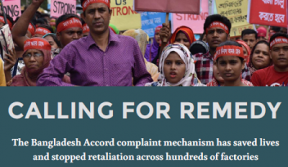When the Rana Plaza building collapsed, I was
moved to find out more about an industry that could be so casually wasteful of
human life. I discovered that Bangladesh
was the world’s second-largest exporter of manufactured clothing, that the
industry employed almost 4 million people-- mostly women-- and that clothing
exports made up almost 80% of Bangladeshi export earnings. Like the Rana Plaza building itself, the
industry had sprung up quickly, without meaningful government oversight-- and
on the same shaky foundations of greed, graft and the planet’s lowest minimum
wage.
Statistics like this provide one way into the pain and truth of
an occurrence. Family history gave me
another.
A hundred years ago my family immigrated from Czarist Russia to
New York City’s Lower East Side. They
had come for political freedom, but making a living was the desperately
immediate necessity. Despite my great
grandmother’s ingenuity, my great grandfather’s wage could not be stretched to
cover the family bills. My grandmother
was the oldest available child. They
piled her hair on her head, dressed her in a long skirt and sent her to work in
the sweatshops.
She toiled long hours. She
lived in a slum so filthy and overcrowded that the title of a book about it (How
the Other Half Lives) became shorthand for substandard living
conditions. She was forced to witness
human desperation no young person should see.
She owned one skirt and two blouses. On her only day off, she washed her
clothes and her hair and stayed home, waiting for them to dry, so she could
return clean for another exhausting week’s work.
It was 1910. My
grandmother was 13 years old.
In 1911 fire broke out at the Triangle Shirtwaist Factory, not
far from where my grandmother lived and worked.
Doors to stairwells and exits had been locked to prevent theft. More than 100 garment workers died. This was our Rana Plaza. In those days, public outrage and the reforms
it sparked were national. Today a
globalized economy means that protest must cross boundaries to have meaningful
effect.
My grandmother’s sweatshop experience, which warped her spirit
from the inside out, gives me an insight that takes me beyond statistics. Aside from the inescapable low-level anxiety
of working in an industry where fire, industrial accident and building collapse
are routine, I know that today’s sweatshop workers feel the humiliation of
living in squalid, overcrowded slums. I
know that they never get enough rest, and must always worry that if they get
sick or injured on the job, even their low standard of living will be put at
risk. I know that above all, they feel
shame that no matter how long or how hard they work, their skimpy paychecks
will not stretch to cover their families’ needs. They will be forced to send their children to
work instead of to school.
As a child, I was angry at the meanness that made my
grandmother’s life a misery. As an old
lady, I want better for her Bangladeshi brothers and sisters. Urging apparel companies to sign the Accord
on Fire and Building Safety in Bangladesh is the best means we have to help
them secure that better future.

